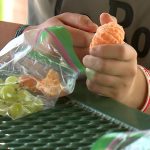Study Shows Children Eat More Calories In Post-Game Snacks Than They Expend On The Field
Jun 18, 2021, 7:40 PM | Updated: Jul 5, 2023, 2:15 pm
KAYSVILLE, Utah — A BYU study shows kids eat more calories in post-game snacks than they burn during the actual game. With a childhood obesity rate of 19 percent in the United States, dieticians are concerned.
One Utah dad and coach said he is keeping health a priority on the field.
Steve Harris of Kaysville loves his children and sports, making him the perfect coach for all four of his children’s teams — soccer, basketball and baseball.
He said they’ve created lots of memories together over the years.
“I wanted my kids to grow up being, ‘Yeah, Dad was there. He was involved with us, having fun with us, playing sports,’” he said.
Harris is also a fifth grade teacher.
“I see kids get unhealthy snacks all the time,” he said. “Kids bring snacks for birthdays, treats, whatever.”
Harris and his wife, who is a nurse, decided the soccer field didn’t need more sweets.
“We’re having two, three games a week, you know, so if they have those unhealthy snacks, that’s two, three times a week… they’re getting it,” he said.
So he implemented “the halftime fruit.”
“[It] gives them some natural sugars so that they have more energy for the second half of the game, because they’re already tired then,” he described.
Tara Finnerty, a pediatric dietician with Intermountain Healthcare, said feeding athletes treats is counterproductive.
“We’re kind of negating those benefits by providing foods with high sugar, processed foods — they’re loaded with calories that are really, actually unnecessary,” she said.
Instead, opt for whole foods and water, she encouraged.
“You can get that same benefit from oranges and apples and bananas, maybe some higher protein foods like peanut butter and yogurt, string cheese, hummus with vegetables, even air popped popcorn” she said.
A recent study by the American Journal of Health Behavior found, on average, children are only getting 27 minutes of physical activity per game.
Finnerty argued they’re just not exercising long enough to add the extra calories.
“They’re consuming far more calories than they’re actually burning during these physical activities,” she said.
For example, she said most 20 ounce sports drinks contain about a 1/4 cup of sugar.
While Finnerty said parents don’t need to count their child’s calories, they can still be mindful.
“Kids are growing. We need to fuel their bodies in a healthy way,” she said, creating healthy habits while they’re young. “We need to nourish their body, not just give them this endless supply of sugary calories or empty calories.”
She encouraged people to look at how often they are consuming these foods and identify where they can swap the treats out for healthier options.
“The special occasions are turning into daily events,” she said. “And then the next day, it’s the family barbecue, and the next day it’s a holiday… and pretty soon it’s we’re using food for every event — good and bad.”
Harris said his teams have responded well to the adjustment.
“Parents have loved it. They think it’s a great idea because it’s promoting healthy eating,” he said. “It’s just been the expectation, like that’s what we do. And really, I’ve found that kids are happy as long as they’re getting something.”
Harris has already signed up to coach all of his children’s teams again next year.
“Oh, it’s the best. That’s what life’s all about — seeing your kids grow up, having fun and then getting to mesh that with sports… it’s a win-win for me,” he said.
The US dietary guidelines recommend children younger than two years should not be fed foods or beverages with added sugars at all.
Finnerty suggested limiting added sugar intake for all children in general.
“It truly is addicting and so they kind of just get this ongoing sweet tooth,” she said.
She said this will help prevent long-term illnesses related to obesity like heart disease, type 2 diabetes, pre-diabetes, cancers and even dementia.
Finnerty also said when kids graze on unhealthy foods, it can spoil their appetite before dinner time and prevent them from getting the nutrients they need.
“It really does impair their appetite to want to eat healthier foods at the mealtime,” she said.



















